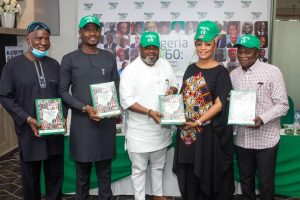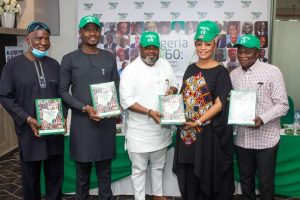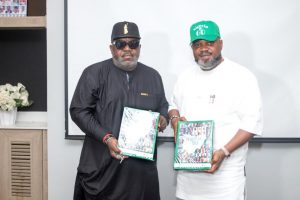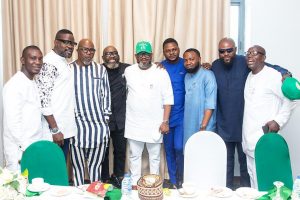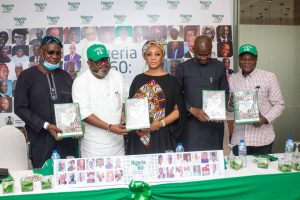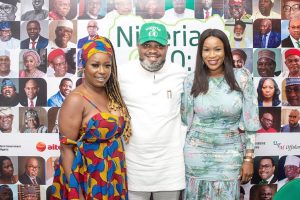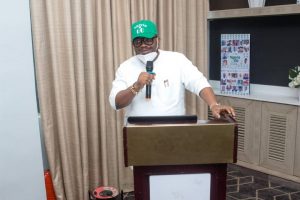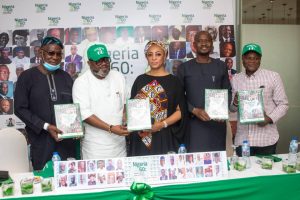
Biographer extraordinaire, Lanre Alfred, is a prose stylist and celebrity journalist remarkable for the splendid force and ornate vigour of his words. Flaunting matchless fecundity, his writing births brilliant themes, and he effortlessly imbues the blandest motif with melody, and dramatic interest. Nobody forgets the first time they read a book by Alfred; everyone wishes for an encore. His words resonate profoundly, offering each reader a personalised experience even as he inspires all to journey with him, and savour the lyrical continuum and clarity of his thoughts. Thus the grandeur of his artistry and the deserved acclaim trailing his works. At the heel of his fifth book, Alfred has produced yet another inspiring literature: “Nigeria at 60: Foremost Nigerians of the Last 60 years”, a broad narrative of the exploits and monumental achievements of Nigeria’s finest league of extraordinary statesmen, magnates, professionals and patriots in the last 60 years. In this interview with…., the maverick and prodigious writer reveals why he embarked on the project and the adventures of his soul in putting it together. Excerpts…

What inspired the book, Nigeria @60: Foremost Nigerians of the Last 60 years?
If you examine my career over the past two decades, you will discover that I have specialised and excelled, to God be the glory, in chronicling people and events. Being a widely-travelled journalist has also opened up my eyes to the fact that our job as reporters does not start and end on the pages of our medium. So, a few years ago, I wrote my first book; a coffee table book called Lifestyle of the Rich and Famous. It was very well-accepted and it spurred me on to other book-writing ventures. In 2017, I published The Titans (The Amazing Exploits of Nigeria’s Greatest Achievers) and I was also widely applauded for it. But this latest effort attempts to fill a gap in our national history – the lack of books on some of our past and present heroes. Whether we want to believe it or not, Nigeria is a nation that is guilty of not keeping data, which has, over the years, led to the distortion of her history. Many of those who came before us, despite all their monumental talents and achievements, refused to pass on to us lessons that can guide us as we navigate through the labyrinth of life. Our generation is the poorer for it because many do not have a sense of where they are coming from or where they are headed. So, what this book has done is to spotlight and profile extensively those who have contributed to the development of this nation in their different fields of endeavor.
Indeed, Nigeria has many heroes and achievers across the different spectrum of the society; how easy or otherwise was it for you to zero in on those featured in the book?
That was one of my greatest challenges in writing the book. I have a close-knit team of researchers and for many weeks, we deliberated and argued, for and against, several names on the initial list. There were some people whose achievements, we felt, did not measure up to the standard of inclusion set for characters in the book, and we were unanimous and unbiased in de-listing them. Nigeria has been blessed with many great citizens; so, for instance, in football, how do you talk about Kanu Nwankwo and leave out Stephen Keshi? When you compare their antecedents, you would see that they both merit being listed but the dilemma would now be that only one of them can be profiled because of space constraints or some other of such factors. We had many of such knotty moments but at the end of the day, we are all happy with the output because no sector was left out and no worthy person was excluded.
How long did it take to write the book and what was the experience like?
I think more time was spent on researching and compiling the list than actual writing. By the time the list was compiled and I came into agreement with my team on what style to adopt, it was easy to start writing. I must confess that the COVID-19 lockdown was a blessing in disguise as it gave me a lot of time to write without the distractions of work and my other business endeavors. As regards the experience, well, I have been there before. So, it was nothing otherworldly. However, writing this book opened up my eyes to the richness of Nigeria’s socio-cultural and political history and the roles certain individuals played in her evolution.
What do you hope to achieve with this book?
That’s deep. I want this book to be available to secondary school students across the country, to read and be inspired in pursuit of greatness than those profiled in the book. Secondary school students, especially, are at an impressionable age and this is the time we, as parents and leaders, must observe a collective responsibility to present to them, a broader range of role models, and not narrow their choices to some fickle celebrities without substance. I would also like this book to be present on every library shelf in higher institutions in Nigeria and beyond.
Why did you dedicate the book to the chairman of Globacom, Dr. Mike Adenuga?
The story behind my decision is quite interesting. I have always followed his giant strides in the business world. After examining carefully, the impact of his business on the lives of Nigerians and Africans, in general, it was hard to pick anyone ahead of him. So, the book is especially dedicated to the man popularly called ‘The Bull’ as a homage to his humanity and relentless strides at rewriting the African business narrative; for standing tall and wading through odds with the courage of a knight and confidence of a champion. In a land dogged by human and infrastructural lapses, Dr. Adenuga’s humanity and entrepreneurial ingenuity nourishes the glands of kith and kin even as his genius oils the wheels of industry. What you would also find intriguing is that, unlike the proverbial warrior who lives to chant the poetry of his own deeds and derring-do, Dr. Adenuga remains impressively humble and immune to conceit, treading a rare path to acclaim. He attracts honour in torrents, at home and abroad. And I am happy to dedicate the book to him because his exploits continually resonate as an undying tribute to mankind’s better nature. Dr. Adenuga emerged as a worthy recipient of such honour because his deeds and recurring success establish him as a man who challenged resolve with steely grit, and exploited the arduous planes of ambition and toil, till he encountered grandeur at the crossroads, where wild contemplation and hard work morph into triumph. And interstingly, amid the ravage of the coronavirus, the widespread gloom and apprehensions of citizenry and industries caught on the receiving end of the pandemic, Adenuga has raised hopes and planted joy in the bosoms of Nigerians. His huge donations to the Federal Government and several state governments have been instrumental to the containment of the virus. These are no doubt the hallmarks of a selfless man and patriot, and are thus, worthy of being celebrated.
What do you seek to achieve with this new book?
I seek to celebrate Nigeria’s finest breed of entrepreneurs, statesmen, sportsmen, and other professionals – all patriots, across all fields of endeavour. I wrote the book keeping in mind the need to satisfy the needs of Nigeria’s upscale, intelligent, sophisticated, and proletariat demographic. The purpose is to emphasize that, whether you’re born with a silver spoon or not, it is possible for you to rise to acclaim through diligence and honest labour, as it was with the case with some of the personalities featured in the book. There is no way to emphasize my vision and sojourn in putting together this effort. I do not seek to demean or canonize any individual with impact neither do I seek to glamourise my access to Nigeria and some of Africa’s most powerful players, each person featured in the book is deserving and worthy of the appellation of ‘role model’ and ‘national hero.’ I hope that writing about them, one way or the other, will help inspire generations of Nigerian youth to greatness.
Let’s talk abour your genre of journalism. Why is celebrity journalism thriving these days?
With due respect, my genre of journalism has always been thriving, it has never suffered a lull. Celebrity journalism has always been part of journalism in plain sight. You see, there is a lot about journalism that has to do with this particular genre. Celebrity journalism, I would say, represents the kernel of journalism. It projects the essence of what is widely regarded as mainstream journalism. In a nutshell, celebrity journalism has always been mainstream. There is the argument that celebrity journalism only focuses on famous people, the filthy rich and so on, but isn’t mainstream journalism all about famous people? Isn’t celebrity journalism about famous people? If you take an indepth look into the philosophy of the five Ws and H of journalism, you would find that, journalism was and is still essentially modelled to perpetuate news about celebrities, the rich, the powerful and the famous. Journalism, basically, is about famous people and people who are extraordinary in some ways, thus standing out from the middling crowd. Journalism is also about ordinary people who become famous by doing extraordinary things. In the real sense of it, there is no difference between celebrity journalism and mainstream journalism.
You have put in almost two decades into this profession and it is obvious that you love it.
Yes, I really do love it. I believe that journalism is one of the most noble professions in the world. It is a calling and when you align yourself with that calling, it is only natural that you will love and enjoy it. And I have never had any struggle in loving the profession.
Your style of writing is particularly interesting. You begin your stories with proverbs, parables and commentaries. Why is it that you don’t like to go straight to the point?
It’s impossible for me to simply go straight to the point. Life is a dance of seduction, encompassing every living and inanimate thing into its intricate and sensual weave. And so is writing. No living thing or element can live in immunity of that slow, provocative dance of wonder and intrigues that characterises life. I apply similar wisdom to my writing. But let me hold back a bit before I start waxing too esoteric for the purpose of this interview.
I can’t write just for writing sake; I believe every story offers new opportunity to titillate the readers and lure them into the world or event being reported and the artistry of the reporter or writer. It doesn’t matter if the story you read does not bear my byline. It could be a piece I am editing; I simply can’t let a good story go unburnished with the needed shine. Even the most boring happenstance or person deserves to be reported with finesse. Writing should be rapturous to the writer and to the reader, it should be equally thrilling. I write the way I do because that is who I am. Do not forget that the perfect window into the psyche of a writer is always through his writing.
One must admit that some of the intros in your stories make interesting read. But don’t you think they may not be suitable for people who are in a hurry?
I don’t think so. I believe that the man or woman who is too much in a hurry to read hasn’t the temperament or the depth for good literature.
You look so quiet and gentle, incapable of writing the kind explosive stories you write.
That is simply the way Lanre Alfred is cut out to be. (laughs). I am actually a very private fellow. I have a very close circuit of friends. And I think I attract like minds. On writing explosive stories? Well, we’ve all got a bit of thunder in us.
How do you write? Do you have some rituals or habits you must indulge in before you start writing?
I have an eclectic writing habit. But I love a bit of serenity most of the time. Yet, you would be amazed to see me scribbling away in the midst of some mad noise. Well, I will say that eclectic best defines my writing culture.
EVENT PICTURES
